-
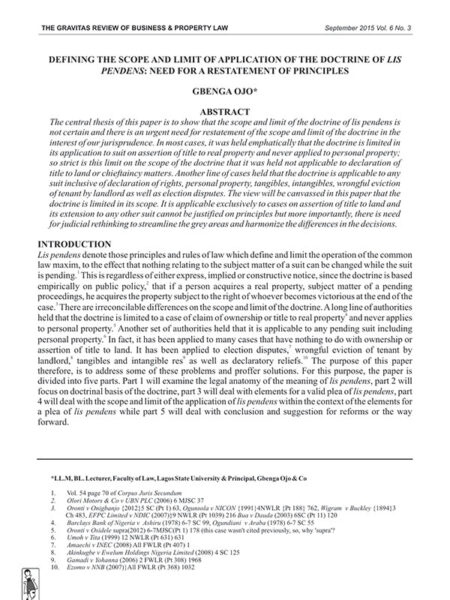
Defining the Scope and Limit of Application of the Doctrine of Lis Pendens: Need for a Restatement of Principles
0₦2,500.00Gbenga Ojo, Lecturer, Lagos State University & Principal, Gbenga Ojo & Co in “Defining the Scope and Limit of Application of the Doctrine of Lis Pendens: Need for a Restatement of Principles” dissects several decided cases on the doctrine of lis pendens and argue that some of them including a Supreme Court case may have been decided per incuriam.
-
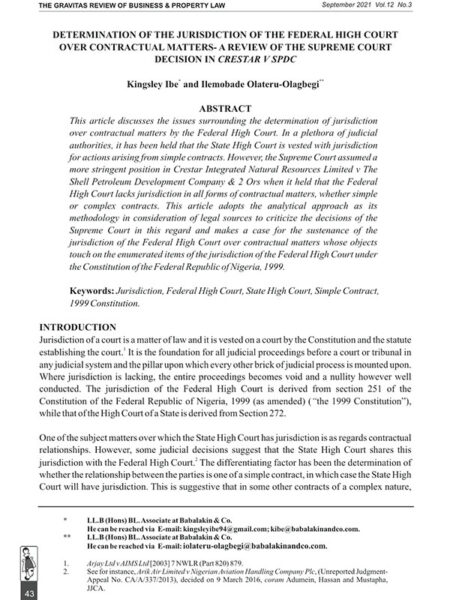
Determination of the Jurisdiction of the Federal High Court Over Contractual Matters- A Review of the Supreme Court Decision in Crestar V SPDC
0₦2,500.00Kingsley Ibe and Ilemobade Olateru-Olagbegi, both of Babalakin & Co, in their article, Determination of the Jurisdiction of the Federal High Court Over Contractual Matters- A Review of the Supreme Court Decision in Crestar V SPDC, examine the incipient confusion over the decision of the Supreme Court that a Federal High Court has no jurisdiction over contractual matters; whether the contract is simple or ‘complex’. They explore the historical jurisdiction of both States and Federal High Court on contracts, and argue that the Federal High Court should still have jurisdiction over contractual matters if the issue pertains to those items enumerated in section 251 of the 1999 Nigerian Constitution.
-
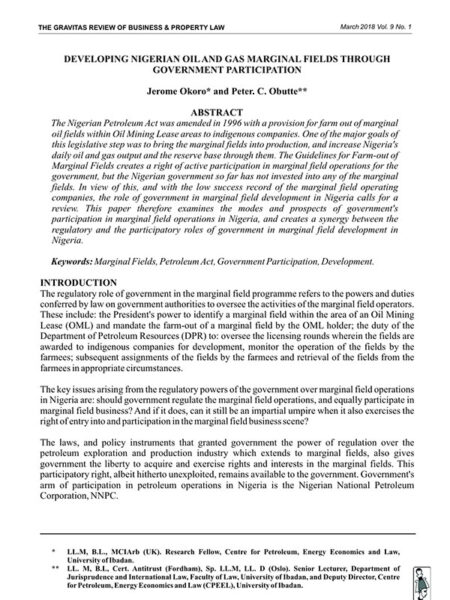
Developing Nigerian Oil and Gas Marginal Fields through Government Participation
0₦2,500.00Jerome Okoro and Dr. Peter Obutte, of the Centre for Petroleum, Energy Economics and Law, University of Ibadan in their article, “Developing Nigerian Oil and Gas Marginal Fields through Government Participation”, define what qualifies as a marginal field and note that the 1996 amendment to the Petroleum Act provides for farming out of marginal oil fields within Oil Mining Lease areas to indigenous companies. A major goal of the law was to bring the marginal fields into production, and increase Nigeria’s daily oil and gas output and the reserve base through them. Though the Guidelines for Farm-out of Marginal Fields creates a right of active participation in marginal field operations for the government, the Nigerian government so far has not invested into any of the marginal fields Okoro and Obutte undertake a review of the Nigerian marginal field development program, the legal basis of regulatory role of government, structure of Nigerian petroleum operations and expected reforms under the Petroleum Industry Governance Bill, 2017.
-
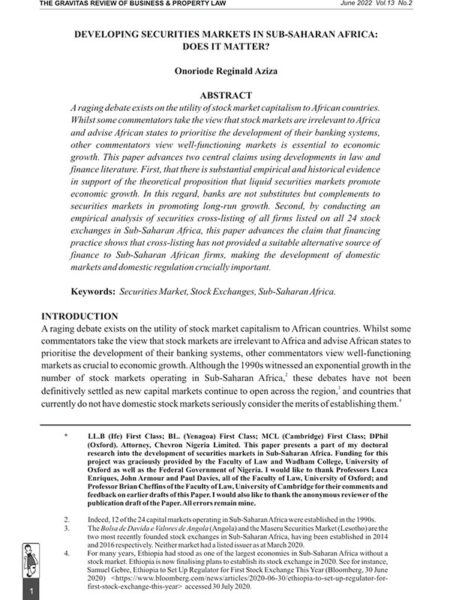
Developing Securities Markets in Sub-Saharan Africa: Does it Matter?
0₦2,500.00Dr Onoriode Aziza of Chevron Nigeria, in his landmark study, Developing Securities Markets in Sub-Saharan Africa: Does it Matter? notes the raging debate on the utility of stock market capitalism to African countries. Whilst some commentators take the view that stock markets are irrelevant to Africa and advise African states to prioritise the development of their banking systems, other commentators view well-functioning markets as essential to economic growth. Dr Aziza advances two central claims using developments in law and finance. First, there is substantial empirical and historical evidence supporting the theoretical proposition that liquid securities markets promote economic growth. In this regard, banks are not substitutes but complement securities markets in promoting long-run growth. Second, by conducting an empirical analysis of securities cross-listing of all firms listed on all 24 stock exchanges in Sub-Saharan Africa, Dr Aziza advances the claim that cross-listing has not provided a suitable alternative source of finance to Sub-Saharan African firms, making the development of domestic markets and regulation crucially important.
-
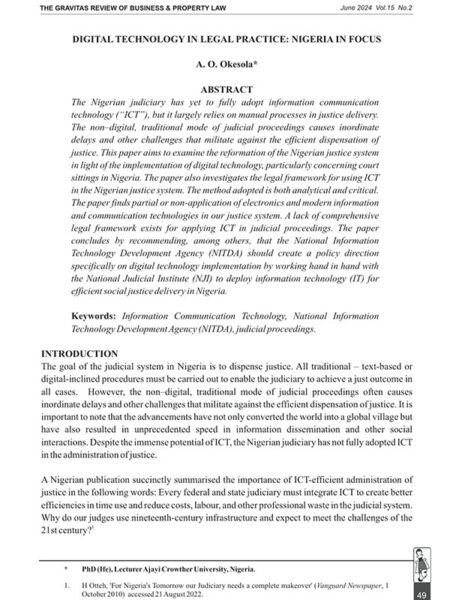
Digital Technology in Legal Practice: Nigeria in Focus
0₦2,500.00Dr. A.O. Okesola, in his article, Digital Technology in Legal Practice: Nigeria in Focus, examines the reformation of the Nigeria justice system in the light of the implementation of digital technology, particularly as it pertains to court sittings in Nigeria. Okesola also investigates the legal framework for the use of ICT in the Nigeria justice system. The method adopted is both analytical and critical. Okesola finds that there is partial or non – application of electronics and modern information and communication technologies in our justice system. There is also non – existing comprehensive legal framework for the application of ICT in judicial proceedings. Okesola concludes by recommending among others that the National Information Technology Development Agency (NITDA) should create a policy direction specifically on digital technology implementation by working hand in hand with the National Judicial Institute (NJI) to deploy information technology (IT) for efficient social justice delivery in Nigeria.
-
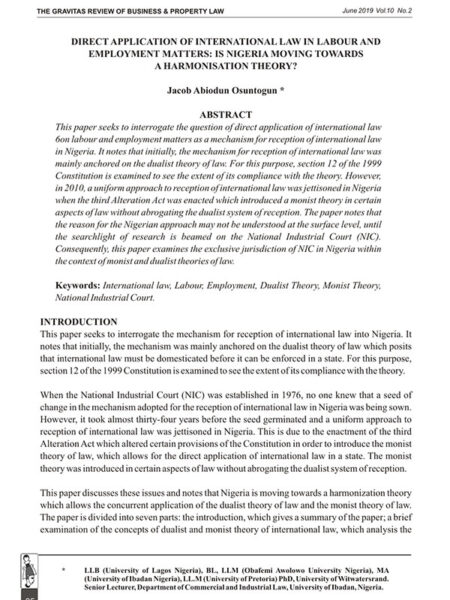
Direct Application of International Law in Labour and Employment Matters: Is Nigeria Moving Towards a Harmonisation Theory?
0₦2,500.00Dr Jacob Osuntogun, Senior Lecturer, Department of Commercial and Industrial Law, University of Ibadan Nigeria in his article, Direct Application of International Law in Labour and Employment Matters: Is Nigeria Moving Towards a Harmonisation Theory? interrogates the issue of direct application of international law in labour and employment matters in Nigeria. Ordinarily, unless international treaties and conventions are domesticated in accordance with section 12 of the 1999 Constitution, they are not applicable in Nigeria. However, section 254C (2) of the Constitution Third Alteration Act 2010 seems to have introduced a monist approach which allows a direct application of international law in labour and employment matters without abrogating the dualist system of reception of international law. Dr Osuntogun examines the dualist and monist controversy and the emergent harmonisation theory within the context of the exclusive jurisdiction of the National Industrial Court.
-
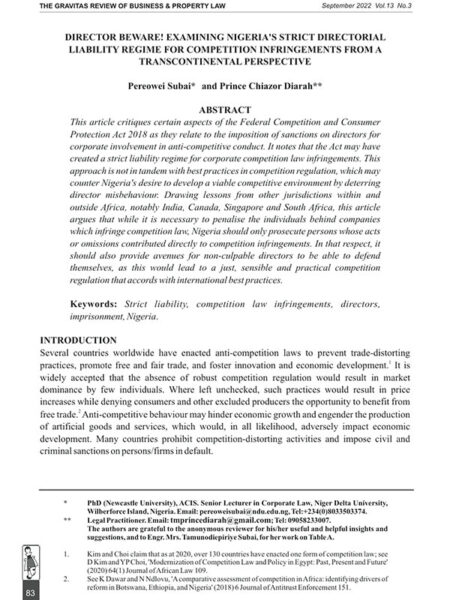
Director Beware! Examining Nigeria’s Strict Directorial Liability Regime for Competition Infringements from a Transcontinental Perspective
0₦2,500.00Dr Pereowei Subai, Senior Lecturer in Corporate Law at the Niger Delta University, Wilberforce Island, Nigeria and Prince Chiazor Diarah in their article, Director Beware! Examining Nigeria’s Strict Directorial Liability Regime for Competition Infringements from a Transcontinental Perspective, critique certain aspects of the Federal Competition and Consumer Protection Act 2018 (FCCPA) as they relate to the imposition of sanctions on directors for corporate involvement in anticompetitive conduct. They note that the FCCPA seems to have created a strict liability regime for corporate competition law infringements. This approach is not in tandem with best practices in competition regulation which may be counterproductive to Nigeria’s desire to develop a viable competitive environment by deterring directors’ misbehaviour. Drawing lessons from other jurisdictions within and outside Africa, the authors argue that while it is necessary to penalise the individuals behind companies which infringe competition law, Nigeria should only prosecute persons whose acts or omissions contributed directly to competition infringements.
-
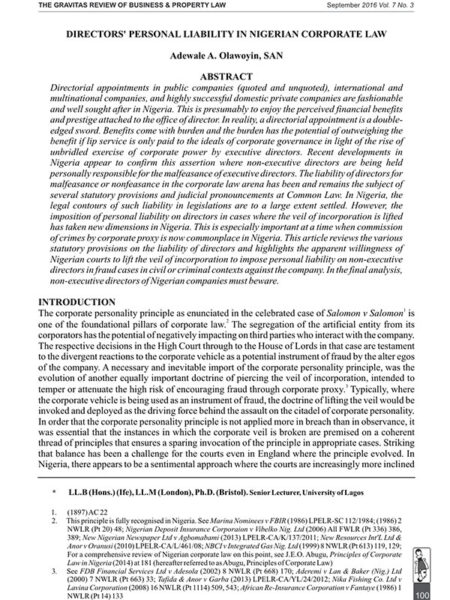
Directors’ Personal Liability in Nigerian Corporate Law
0₦2,500.00Dr. ‘Wale Olawoyin, SAN of the Faculty of Law, University of Lagos in his article “Directors’ Personal Liability in Nigerian Corporate Law” reviews various statutory provisions on liability of directors and highlights the apparent willingness of Nigerian courts to lift the veil of incorporation to impose personal liability on directors, including non-executives. He posits that while the liability of directors for malfeasance or nonfeasance in the corporate law arena has been a subject of several statutory provisions and judicial pronouncements at Common Law, the legal contours of such liability in legislations are to a large extent settled in Nigeria. The imposition of personal liability on directors in cases where the veil of incorporation is lifted has taken new dimensions especially now when commission of crimes by corporate proxy is commonplace in Nigeria.
-
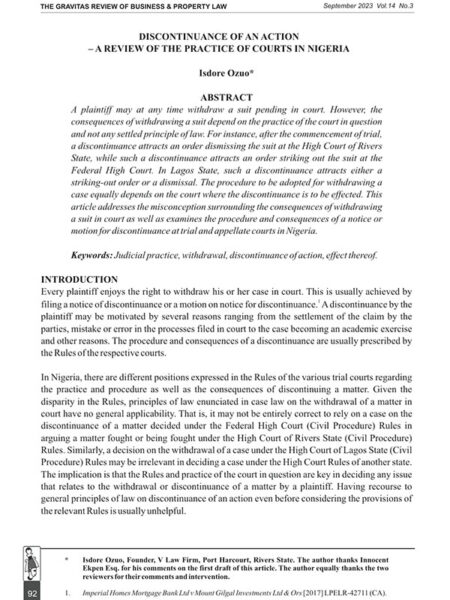
Discontinuance of an Action – A Review of the Practice of Courts in Nigeria
0₦2,500.00Isdore Ozuo, in his article, Discontinuance of an Action – A Review of the Practice of Courts in Nigeria, analyses the legal provisions on the right of a plaintiff to discontinue an action in the different strata of court. A plaintiff may at any time withdraw a suit pending in court. However, the consequences of withdrawing a suit depend on the practice of the court in question and not any settled principle of law. For instance, after the commencement of trial, a discontinuance attracts an order dismissing the suit at the High Court of Rivers State, while such a discontinuance attracts an order striking out the suit at the Federal High Court. In Lagos State, such a discontinuance attracts either a striking out order or a dismissal. The procedure to be adopted for withdrawing a case equally depends on the court where the discontinuance is to be effected. The article addresses the misconception surrounding the consequences of withdrawing a suit in court as well as examines the procedure and consequences of a notice or motion for discontinuance at trial and appellate courts in Nigeria.
-
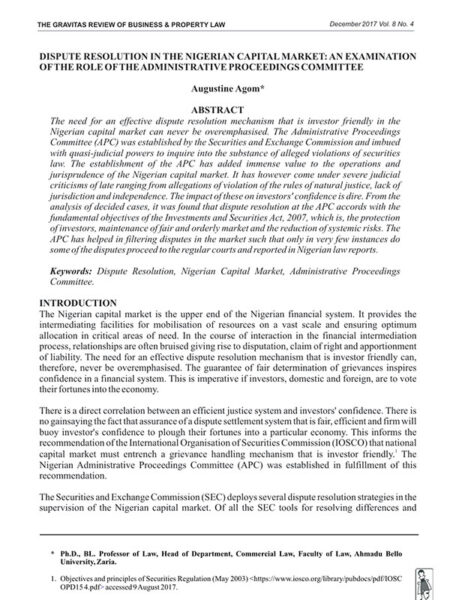
Dispute Resolution in the Nigerian Capital Market: An Examination of the Role of the Administration Proceedings Committee
0₦2,500.00Professor Augustine Agom, Head of Department, Commercial Law Ahmadu Bello University, Zaria in his article, “Dispute Resolution in the Nigerian Capital Market: An Examination of the Role of the Administrative Proceedings Committee”, considers the role of the Administrative Proceedings Committee in the resolution of disputes, its creation, constitution, and procedure. He tackles the criticisms against the Committee especially the allegations of determination of issues with elements of crime, and of violation of fair hearing by the Committee due to the all-pervading influence of the Securities and Exchange Commission.
-
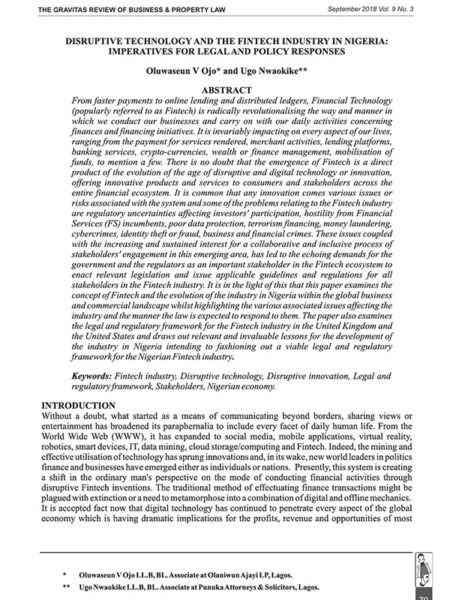
Disruptive Technology and the Fintech Industry in Nigeria: Imperatives for Legal and Policy Responses
0₦2,500.00Oluwaseun Ojo of Olaniwun Ajayi LP, and Ugo Nwaokike of Punuka Attorneys and Solicitors in their article, Disruptive Technology and Fintech Industry in Nigeria: Imperatives for Legal and Policy Responses, note that the emergence of Financial Technology (popularly referred to as Fintech) is a direct product of the age of disruptive and digital innovation. Fintech is impacting on every aspect of lives, ranging from payment for services, merchant activities, lending platforms, banking services, crypto-currencies, wealth and finance management. They appraise issues affecting the Fintech industry in Nigeria including regulatory uncertainties affecting investors’ participation, hostility from Financial Services (FS) incumbents, poor data protection, terrorism financing, money laundering, cyber crimes, identity theft and financial crimes. They review the legal and regulatory framework for the Fintech industry in the United Kingdom and the United States and draw out relevant lessons for the development of the sector in Nigeria.
-
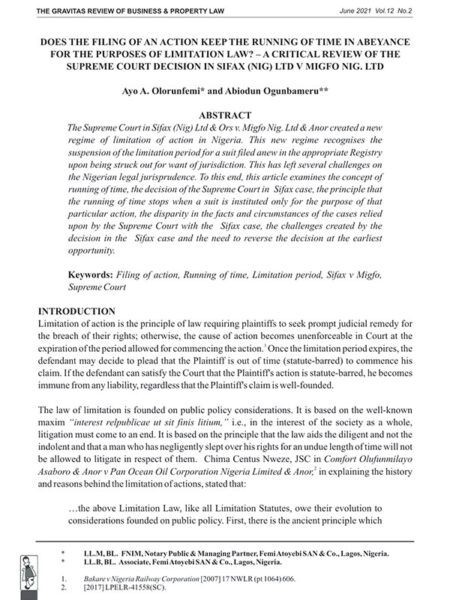
Does the Filing of an Action Keep the Running of Time in Abeyance for the Purposes of Limitation Law? – A Critical Review of the Supreme Court Decision in Sifax (Nig) Ltd v Migfo Nig. Ltd
0₦2,500.00Ayo Olorunfemi and Abiodun Ogunbameru, Managing Partner and Associate respectively at Femi Atoyebi SAN & Co in their article, Does the Filing of an Action Keep the Running of Time in Abeyance for the Purposes of Limitation Law? – A Critical Review of the Supreme Court Decision in Sifax (Nig) Ltd v Migfo Nig. Ltd, examine the new regime of limitation of action created by the Supreme Court in Sifax v Migfo and how it recognises the suspension of the limitation period for a suit filed anew in the appropriate Registry upon being struck out for want of jurisdiction. They examine the concept of the running of time, the principle that the running of time stops when a suit is instituted only for that particular action, the disparity in the facts and circumstances of the cases relied upon by the Supreme Court, and the several challenges created by the decision in the Sifax case.
The Gravitas Review of Business & Property Law



